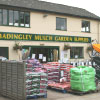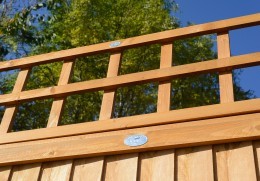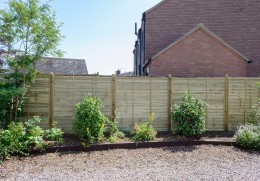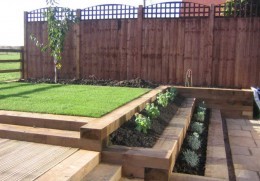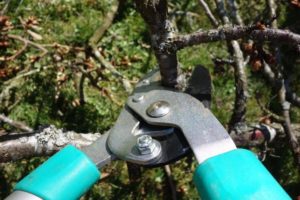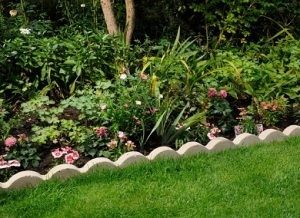Top Trends from This Year’s Chelsea Flower Show
The Chelsea Flower Show, an annual event organised by the Royal Horticultural Society (RHS), is the jewel in the British gardening crown. Medals here are among the most sought-after across the whole of the UK.
The show also acts as an inspiration to horticulturalists across the country. At Madingley Mulch, as garden supplies specialists in the Cambridge area, we take an interest in what’s new at Chelsea, and here we look at five top trends from this year’s show.
The Natural Look
Mark Gregory, who won a Gold Medal for his Welcome to Yorkshire garden, put a premium on cornflowers, wild lupins and cow parsley (above) as he recreated a spring meadow in a garden setting. The Duchess of Cambridge, Kate Middleton, also designed a garden called Back to Nature, which included a swing seat and a treehouse alongside a variety of wild green shrubs and trees.
Reusing and Upcycling
Graham Bodle, who won a Silver Gilt medal for his Walker’s Forgotten Quarry entry, proved that even the most unlikely of materials can be put to good use in a garden. A rusty old stove functions as a pizza oven, while bent pipes are used as a handrail. The whole effect was completed by using reddish-brown-coloured plants such as primulas, acers, geums and epimediums.
Child’s Play
The winner of the Gold Medal in the Space to Grow category, Jody Lindgard, crammed as much as he could into his Montessori Children’s Centenary Garden. The result was an explosion of colour, with tangerine dahlias vying for space with rich blue delphiniums and bright pink peonies. He also grew upwards, with his green wall containing several different types of herbs, edible flowers and vegetables.
Be Bold with Trees
One of the most notable features of this year’s show were the number of designers who made full use of eye-catching trees. Chris Beardshaw, in his Gold Medal-winning Morgan Stanley garden, used a huge pine, while monkey puzzle trees showed up in a number of other entries.
Optical Illusions
Another space-creating idea seen at the show was the use of dramatic hard landscaping features. Joe Perkins, who won a Gold in the Space to Grow category, used weathered, reclaimed timber to create a decking, a water feature and a copper and steel canopy, all set at unusual angles. The effect was topped off with a variety of pebbles, rocks and other aggregates.
High-quality Garden Supplies from Madingley Mulch
If you want to achieve effects inspired by Chelsea in your garden, Madingley Mulch can help. We supply a wide variety of mulches, barks, soil conditioners and composts to help your plants thrive, whether you are growing pine or monkey puzzle trees, dahlias or delphiniums, or primulas and acers. Our soil improvers include Tony’s Tonic and Denise’s Delight, a conditioner with an exclusive mix of Black Fen soil, horse manure, wood shavings and other plant nutrients.
We also stock a variety of hard landscaping materials. These include building sand and ballast, plus a selection of gravels, round stones, shingle, decorative stones and pebbles.
Madingley Mulch operates a free delivery service on all garden supplies orders within 15 miles of our base on the edge of Cambridge. We have regular weekly runs to Haverhill, Saffron Walden, Royston and Huntingdon, along with many other towns and villages in the region. There is a standard £20 charge if you live up to 24.5 miles away, and we can also deliver further afield. Browse our products by clicking the link above.
Which Type of Wooden Fencing is Best for Your Garden?
Wooden fences have stood the test of time – they are an affordable way of marking out and protecting your garden, as well as acting as a natural complement to all the flowers, shrubs and trees you want to grow.
Madingley Mulch supply a wide range of fence panels to customers in Cambridge and the surrounding area, including Ely, Newmarket, St Ives and St Neots. Here we look at the pros and cons of the three main types.
Trellis Fencing
This is a particularly versatile solution for your garden, as these panels can be used on their own, on top of, or against, an existing solid fence or wall. Their lattice framework encourages the growth of climbing plants such as honeysuckle, jasmine, clematis and wisteria.
Trellis fencing panels will add character and charm, and trellises have security benefits too. When combined with a lap fence panel, it means you have a much higher screen, which makes your garden much more secure. A trellis can also give support to roses, complete with thorns, to deter any would-be burglars.
Picket Fencing
These are usually lower than their trellis or solid wood equivalents. They are particularly well suited to front gardens, as they give the home plenty of added kerb appeal. Picket fence panels can also act as boundary markers, so your garden can be home to several different zones, such as a child’s play area. a wildlife-friendly section, and a vegetable patch. You can also use picket fences as a natural, stylish surrounding to a swimming pool or pond.
Their lack of height means they offer less protection against larger animals than many of the alternatives, and they won’t always stop children from straying into areas of the garden you don’t want them to enter. However, they can be less prone to wind damage because of the gaps between the pickets. These types of fences also let plenty of light through, which could be important if you have plants growing nearby.
Solid Wooden Fencing
This type of fencing offers plenty of privacy and security, making it an ideal barrier between your neighbour’s garden and your own. It should deter any would-be intruders, while keeping your own children – or pets such as dogs – safe and secure. Bins, compost heaps and other unsightly features of your garden can also be hidden behind it.
However, solid wooden fencing also blocks out light, which may restrict the types of plants you can grow up against it. And keeping the wood in good order is a much more time-consuming task than for other types of fencing, because there is so much more of it to paint and preserve.
Garden Fence Options from Madingley Mulch
At Madingley Mulch we offer a range of fencing options to suit all your needs. Our 1.8m by 0.9m picket panels will give your garden a light, open appearance, while our heavy duty trellis fencing come in a range of sizes, from 0.3m to 1.8m, so you can use them on their own or as an addition to a solid fence.
If you are looking for lap fence panels, our solid wood Professional Lap Panels are suitable for most gardens, providing privacy and a neutral backdrop. We also supply Ultimate Lap Panel fencing, which is made from straight cut slats and fine sawn timber.
We offer a free delivery service on all orders within 15 miles of our base on the edge of Cambridge. We have regular weekly runs to Cambridge, Ely, Newmarket, St. Ives, St Neots and many other towns and villages in the region. There is a standard £20 charge if you live up to 24.5 miles away, and we can also deliver further afield.
We also supply plenty of accessories to help maximise the life of your new fence. These include posts and a cement mix to ensure that the panels are fixed securely in place, as well as gravel boards to keep them clear of the ground and to stop the wood from rotting. In addition, our shop stocks different brands of preservative to keep your fence looking good. To view our full range of fencing and associated products, simply click here.
Five Space-Saving Ideas for Your Garden
Space is often at a premium in UK gardens today, with official figures showing that in the UK their average size is much smaller than it used to be. So how can you make the most out of your plot?
Madingley Mulch are experienced suppliers of DIY building materials in Cambridge. Here we have compiled these five top tips for ways in which you can make the most of the space in your garden.
Mix and Match Your Plants
The traditional gardening approach is to create separate areas for growing fruit and vegetables and different types of flowers, but in smaller gardens that may not be possible. Instead, try growing a mix of ornamental and edible plants in the same bed.
This makes it more difficult for predatory pests to home in on specific crops, while also ensuring you have a regular supply of colourful blooms throughout the year. Another advantage is that this will also ensure there are plenty of insects around to pollinate your fruit and veg.
Grow Upwards
Even the smallest of gardens have plenty of space in one direction – upwards. So consider attaching planters to your walls, fences or boundaries, as species such as Kiwi fruits, grapevines, climbing beans and peas will all thrive, given enough sun. Make sure your supports are sturdy enough to cope with a lot of growth, as you may be pleasantly surprised at how quickly these plants shoot up.
Fruit trees can also be trained to grow up walls, fences and trellises. While varieties such as apples and pears need plenty of sun, there are some which will thrive in shadier spots, including gooseberries and redcurrants.
Go Potty
Rather than have your entire space eaten up by large flower beds, an alternative is to use containers and pots as the main feature of your garden instead. Potted plants won’t deprive other shrubs and flowers of much-needed sunlight and moisture, and they can also be moved around to create different effects.
Good plants to grow which don’t take up much room, and will also provide plenty of colour, include lavender, which should thrive throughout the year, and winter-flowering bulbs such as tulip and crocus.
Versatility is Valuable
Even if your garden is small, you will still want somewhere to sit, relax and enjoy it. Buy foldable chairs and tables which you can stack away at the end of the day, and benches and railway sleepers which can be used as either plant supports or as somewhere to sit.
Raised flower beds are a particularly useful feature in smaller plots, as you can install these with low walls, which double up as seating areas. Higher-level plants are also much easier to look after. Madingley Mulch’s exclusive product, Denise’s Delight, a mixture of manure, Black Fen soil, humus and other plant nutrients, is an ideal soil conditioner for all raised beds.
Use All the Space
As well as fences and trellises, try to use every single scrap of available space around your home, even if you don’t think of it as part of your garden. Even smaller areas can often be transformed with tables, benches, or an unusual plant, or even a garden sculpture. Paths can be brightened with decorative stones and colourful gravel.
And have you thought of fitting planters directly underneath your kitchen window? These can be filled with a range of colourful blooms to brighten up your day, or, if you want to be more practical, a range of herbs. Just pick what you need through the window to add some flavour to your meals.
DIY Building Materials from Madingley Mulch
At Madingley Mulch, we supply a wide range of DIY building materials from our base on the edge of Cambridge, including paving slabs, trellis fencing and railway sleepers. Our friendly, experienced staff will be happy to offer advice on how to get the most out of your garden space.
We also offer free delivery for all orders within 15 miles of our own address. A standard £20 charge applies to all orders within 24.5 miles, and we can also deliver to addresses further away as well. Our regular weekly delivery service goes to Haverhill, Newmarket, St Ives, St Neots, and all other towns and villages in the area.
Five Top Tips for Creating a Children’s Play Area in Your Garden
Encouraging your children to enjoy the garden with their own play area will help keep them fit and healthy and give them a lifelong interest in nature. At Madingley Mulch, we are leading suppliers of play area bark to customers in Suffolk, Cambridgeshire, Essex and Hertfordshire. Here we offer five top tips for creating an area of your garden which your children can call their own.
Prepare Properly
In a larger garden, you will want to think about locating the right spot for your children’s area. It’s good to pick somewhere which gets plenty of sun, to encourage them to go outdoors. However, it should also have enough shade to protect them from the sun. Think about the neighbours, too – try to avoid putting it too close to a boundary fence.
Make sure the area is properly cleared, so you are effectively starting with a blank canvas. Remove any weeds, other unwanted plants, and any garden debris such as branches and fallen leaves, and it’s also advisable to tidy up any grass area.
Think Safety
Swings, sand pits, climbing frames and slides all stimulate any child’s imagination. However, accidents can happen, so you should take precautions to guard against any minor injuries.
Madingley Mulch’s play area bark has softer, rounder edges than any alternatives. It can also be used as a mulch in other parts of the garden. We also supply high-quality kids’ play sand from our base on the outskirts of Cambridge. This is stone-free and will not stain, making it ideal for children’s play.
Use the Boundaries
Fencing or marking off your children’s area will make them feel it is their personal space, and you can use the boundaries as a design feature too. You can grow plenty of plants in lightweight pots attached to fence panels, and they don’t have to be conventional ones either – old wellington boots will do just as well. If you want to be more ambitious, try creating a climbing wall, a music fence or even adding a water feature, which obviously needs to be safe for youngsters.
Storage Solutions
Sheds and storage boxes are a valuable addition to the play area. They will give your children somewhere to put their toys at the end of the day, rather than leaving them exposed to the elements. Hollow wooden benches can easily double up as a storage area. Whatever you opt for, remember it can easily be transformed with a lick of paint.
Nurture an Interest in Nature
Children’s zones don’t have to be solely about play. They also provide the ideal opportunity to let them take a more active interest in nature. Good plants to grow from seed include marigolds, poppies and sunflowers. Radishes, courgettes and runner beans are also easy to grow if they want to enjoy the taste of their own fresh vegetables.
Birds can easily be tempted into the area with boxes and feeding tables. Insects can also thrive, either in custom-built ‘hotels’ or in a carefully-constructed pile of rocks, bricks, logs, twigs and leaves. These will attract beetles, spiders, and all sorts of other creatures which make a vital contribution to your garden’s eco-system.
Outdoor Gardening Supplies from Madingley Mulch
Madingley Mulch offer a wide range of outdoor gardening supplies from our base on the outskirts of Cambridge, so we can help you create a bright and distinctive play area for your children. Follow the link above if you would like to know more about our products and prices.
We deliver free to all addresses within 15 miles, with a standard £20 charge applied to all deliveries within 24.5 miles – and we can deliver to addresses further afield as well. Our regular weekly delivery service is available for towns and villages in Suffolk, Essex and across the region, including Royston, Saffron Walden, Newmarket and Cambridge.
5 Top Tips for Looking After Your Garden Fence Panels
A new or well-maintained fence will give any garden a lift. It improves your security and privacy, creates well-defined areas and can effectively be used as an extra area for flowers – particularly if you let climbers like honeysuckle, clematis or wisteria grow up it.
Madingley Mulch supply quality garden fence panels in the Cambridge area. Here are our top five tips for making sure your fencing stays in pristine condition throughout the year.
When Should You Put Them Up?
If you want to put some new panels up, or replace some existing ones, early spring or late autumn is the ideal time to do this. This will give any plants growing nearby, and whose roots might be affected by the work, plenty of time to recover ahead of summer and their peak growing season.
Use a digging spade or post hole digger to excavate the earth, and make sure the holes are at least 2ft deep. It’s always better to have too many posts than too few, so make sure that they are never more than 8ft apart.
Preserve Your Panels…
Summer is the best time to give your fencing panels a fresh coat of varnish or woodstain preservative. Make sure the forecast is for dry weather before you get the brushes out. Ideally the temperature should be above 5C before you start painting, but not too hot, as the preservative will dry out too quickly before the wood has time to absorb it.
Again, think about any plants growing nearby – you may need to consider covering them up to protect them from being splattered by any stray drops of varnish.
…and Wash Them Down
Fungi and fence panels don’t mix, so make sure you keep this natural enemy at bay. Mildew and moss are among the commonest types of problem, as they look unsightly and can weaken the structural integrity of your panels and posts.
These unwanted invaders can be deterred by scrubbing down the affected areas with a stiff brush dipped in a mixture of water and vinegar, or soapy water. Power washing may be necessary if the fungus has become particularly well established.
Watch the Weather
The weather is another natural enemy, so make sure your fence panels are structurally sound before autumn and winter set in. High winds can easily blow the panels over, particularly if the posts are not secure, while frost, ice and snow will expose the wooden panels to more moisture.
You can minimise this risk by making sure any nearby trees or shrubs are properly pruned. This will mean there won’t be any overhanging branches which drop leaves or snow onto the panels.
Hammer in Any Loose Nails and Screws
You should always make sure that any loose nails or screws are hammered in. Unless you have been using a galvanised variety, they will rust, staining the wood. Spending a few minutes checking these over will help keep your fence looking good and reduce the risk of hurting yourself on snags or splinters.
Quality Garden Fence Panels from Madingley Mulch
At Madingley Mulch, we supply a wide range of quality wooden garden fence panels from our shop near Cambridge. These include Professional and Ultimate Lap Panels, picket fencing and trellises. Our sturdy fence posts and gravel boards offer plenty of protection against rotting, and we also stock a cement and sand mix which will ensure your posts are secure in the ground. Follow the link above to see our full range.
We can sort out your fence panel delivery too, whether you live in Cambridge, Huntingdon, Saffron Walden, Haverhill, or any of other towns and villages in the region. This service is free to all addresses within 15 miles of our base, and we charge a standard fee of £20 for all orders within 24.5 miles. We can also deliver to places further away as well.
Top Tips on Creating a Mediterranean-Style Garden
A Mediterranean look is one of the most popular themes for many gardeners – the plants tend to be highly distinctive and low-maintenance, and your garden will become a place for relaxation rather than work.
Madingley Mulch are based on the edge of Cambridge and supply a wide range of garden essentials, including garden patio slabs, gravel and garden stones. Here we look at five key components which you should consider if you want to create your own slice of the Mediterranean in your garden.
Create a Patio for Outdoor Living
Outdoor dining is a longstanding tradition in most Mediterranean countries. The most effective way of creating such a space is to lay down some paving slabs to create the perfect patio. These stand up to a summer drought far better than grass will, and during winter they will remain clean and easy to walk on.
Go for good-quality tables and chairs which you can leave out all the year round. Metal furniture will be a better investment than plastic. If you want to be more ambitious and offer more than barbecued food, you can add an outdoor kitchen or pizza oven to your patio. And remember to factor in plenty of shade, as you won’t want to get too hot, particularly if you are cooking food on your patio.
Paving and Pathways
Paving slabs can also act as garden dividers or footpaths. They are low-maintenance and can be particularly effective in small spaces. You can choose slabs with pink and red hues, or gravel and natural stone styles, to give your garden a Mediterranean ‘feel’.
At Madingley Mulch our Premier Riven garden patio slabs are available in dark grey, natural, stone or red, and we can also supply Indian Sandstone slabs in raj, camel, mint or grey.
Add a Water Feature
These add a focal point to your garden, and smaller water features can often be effective. Digging out a large pond or pool does involve a lot of work, and you may also have to top up the water levels during dry spells. Terracotta storage jars are another option which can create similar effects on a smaller scale
Fountains which recycle the water are another option. These could be installed either on the patio or against the wall, and the bubbling sound is particularly satisfying.
Lay Down Mulch or Gravel
Before planting out your new garden, think about laying down some mulch, soil conditioner or compost. These can suppress the weeds and improves the soil’s drainage and is particularly important in East Anglia, where the heavy clay soil is not ideal for drought-tolerant plants.
At Madingley Mulch we have a range of soil improvers, including Denise’s Delight, an exclusive mixture of Fen soil, wood shavings, horse manure and other plant nutrients. This is ideal for use in raised beds, which are another key feature of a Mediterranean-style garden.
An alternative is to use a layer of gravel or pebbles. In a hot summer, moisture condenses underneath stones, encouraging the growth of plant roots, while during a wet winter the rain will soak in far faster than on concrete areas, reducing the risk of flooding. We can supply a wide variety of decorative pebbles and stones.
Appeal to Sight and Smell
Herbs such as lavender and rosemary are staple ingredients of this type of garden, providing the right sort of fragrance. Good flowers to plant include geraniums and bougainvillea, as these will both add plenty of colour. You don’t have to plant them in the ground, either – terracotta pots and vases are a common sight in Mediterranean gardens. However, you will need to water these reasonably frequently, as potted plants have a smaller reservoir of moisture to draw on during dry spells.
If you fancy something larger, you could try growing either cypress, olive or palm trees. These may need protection from frost if the temperature is likely to dip below freezing point, and they should be planted in the sunniest part of your garden.
Garden Patio Slabs from Madingley Mulch
Madingley Mulch supply key components for a Mediterranean-style plot, including garden patio slabs and decorative pebbles, from its base on the outskirts of Cambridge. Follow the link above to discover our range of products and prices. And if you need any advice about what to plant in your Mediterranean-style garden – and when – our staff will be happy to talk to you.
If you want to place a bulky order with us, we can deliver it to you. We run a regular delivery service to towns and villages in the region, including St Ives, St Neots, Royston, Ely and Newmarket. Orders are delivered free to all addresses which are under 15 miles of our base on the edge of Cambridge, while a standard £20 charge applies to all deliveries within 24.5 miles. We can also deliver to addresses further afield.
How to Keep Your Lawn in Tip-Top Condition
A well-maintained lawn is a boost for any garden. There are plenty of health benefits – the grass absorbs harmful dust and pollen, for example, improving the air quality. Also, nothing beats the sight and smell of a freshly-mown patch of grass.
Leading lawn turf suppliers Madingley Mulch are based on the edge of Cambridge. Here we have compiled these five top tips for making sure you can enjoy some gorgeous green grass all the year round.
Stay on Top of the Cutting
Spring is the time when you will be thinking about getting your lawn mower out of the garden shed. For the first cut of the year, make sure your mower is on its highest setting, as taking too much off too early can damage the grass.
The frequency and the height of the cut will vary depending on the time of year. In spring and autumn, you shouldn’t need to cut your lawn more than once a week. In summer you may need to do it more regularly, particularly if there is good growing mix of sunshine and showers. The mower should also be on a lower setting,
Kill the Moss and Weeds
From late March onwards, you should be trying to get rid of any unwanted moss or weeds, so your grass isn’t competing with them for valuable nutrients in the soil. Remove them either by hand or with a fork, then aerate and scarify the grass.
If manual controls haven’t worked, then try artificial ones by applying a fertiliser which will get rid of the problem plants. Within a couple of weeks, you should be able to rake out all the dead moss and weeds. Don’t forget to repeat this process in the autumn, when the grass-growing season is over.
Water it Well
The variable British weather means that it can be tricky if you want a lush, green lawn all the year round. Try to water when the soil dries out, but before the colour of the grass changes. Once a week during hot weather should enough, and don’t water during the heat of the day. Early morning or late evening is the best time, as it won’t evaporate as quickly.
If your grass turns brown, don’t despair, as it will usually recover, given time. And remember too much water can do just as much damage as too little, because excess moisture encourages moss and means your grass will have shallower roots.
Running Repairs
Does your lawn have any bare patches? Spring or autumn are the best times to repair or overseed them. Rake the surface before sowing in the seed, then lightly rake it into the ground.
Consider putting up some protective netting if there are hungry birds around. If the weather is dry for the first two or three days after overseeding, then water the affected areas gently. You should see the first blades of grass around a week after the seeds were sown.
Laying Down New Turf
If your lawn requires more radical surgery, you may have to consider laying down new turf. Autumn is the best time to create a new lawn, as the grass roots can establish themselves in the soil while it is still warm and moist. Make sure the soil you are laying your turf on is free of weeds, but don’t use weedkiller, as this can stunt the growth of the grass. Either remove them by hand or rotavate the soil to a depth of 20-25cms, then dig in some soil conditioner or well-rotted compost, such as our exclusive products Tony’s Tonic or Denise’s Delight.
The turf should be laid within 24 hours of delivery. You may need to add or remove soil to make sure the rolls are laid flat. Once down, spread in a thin mix of soil or compost and sand over the top to fill in any minor gaps and help the rolls knit together. Water it well and don’t walk on it for the first few days.
Lawn Turf Supplies from Madingley Mulch
Lawn turf suppliers Madingley Mulch are the people to call to keep your grass in pristine condition. Our turf is all grown close to our base near Cambridge. We can also meet all your needs when it comes to top dressing, soil conditioners, compost and grass seed. If you have any questions, talk to our friendly, experienced staff.
If you live within 15 miles of us, we can deliver all your turf free and our weekly routes include Ely, Newmarket, Saffron Walden, Huntingdon, St Ives and St Neots. We apply a standard £20 charge for addresses up to 24.5 miles away, and we can also deliver further afield as well.
Five Practical Uses of Railway Sleepers in Your Garden
When travelling by train, the chances are you don’t give railway sleepers a second thought. But they provide the backbone for thousands of miles of track across the UK – and have plenty of other uses too.
Garden railway sleepers are just one of a wide range of products Madingley Mulch supply from our base on the edge of Cambridge. Here are our top five suggestions for improving your garden with these versatile cuts of wood.
Marking Out a Path
If you want to create a rustic look in your garden, sleepers are an attractive alternative to paving slabs. They will age naturally over time and are particularly effective if you want to create a cottage garden. It will be worthwhile treating the sleepers with a preservative, as the wood can get slippery in wet weather.
Fantastic Furniture
You can fashion some stylish garden furniture out of sleepers – and you don’t even need to be an expert DIYer! You can create a simple, Japanese-style table simply by lining up a few pieces of the wood together. If you want something slightly more ambitious, then simply cut off a section to create the table legs.
Wooden chairs and benches can be created in a similar way – and you don’t have to worry about them blowing away in winter, unlike plastic furniture.
Creating a Raised Bed
Raised beds are a convenient and efficient way of growing a wide range of plants, particularly fruit and vegetables. You can tailor the soil types and drainage to whatever you want to grow, without worrying about the effect this will have on other plants. And because of their durability and strength, wooden sleepers make the ideal framework for this type of feature.
At Madingley Mulch, we can offer an exclusive soil conditioner, Denise’s Delight, which is ideal for all raised beds. Its mix of Black Fen soil, horse manure and other plant nutrients will give your plants every chance of flourishing, whether you live in Hertfordshire, Essex, Suffolk or Cambridgeshire.
Adding Some Decking or Terracing
Decking or terracing is an excellent way of adding to your living space by extending outwards into the garden. It can also cover up any uneven ground.
You can either use railway sleepers as the support structure, or for the whole project – although they will need more work to put together and could prove more expensive than purpose-built decking and terracing.
Creating a Boundary
If you want to separate out different parts of the garden from each other, then using these versatile wooden planks is one way to do it. For instance, you can use them to clearly define where your lawn ends and your flower beds begin.
Alternatively, you can use them to create different ‘zones’ in your garden, with different styles. Children’s play areas, dining spaces and wildlife gardens can all be accommodated in the same garden, simply by laying a few sleepers on top of each other.
Garden Railway Sleepers from Madingley Mulch
Madingley Mulch supply new sawn oak garden railway sleepers from our base on the edge of Cambridge. These are ideal for all types of landscaping projects, including walls, steps, decking and terracing. If you need advice on your landscaping project, then our friendly, knowledgeable staff will be happy to talk to you. You can also follow this link and leave a message via email.
If you have a big order, we can deliver them to your home. We offer a weekly service to Royston, Saffron Walden, Newmarket, St Neots and Ely, and other towns and villages in the area. Delivery is free to all addresses within 15 miles, and there is a standard £20 charge if you live between 15 and 24.5 miles away. We can also deliver to addresses further afield as well.
Five Key Jobs for Your Garden This Spring
Now is the time for gardeners to spring into action – literally! The longer days and shorter nights mean now is the time to get busy in the back garden to make sure it looks at its best during the peak summer months. Here we look at five key jobs to complete during the spring.
Improve Your Soil
Don’t forget to lay down some soil conditioners, compost or mulch over the next few weeks. This will help give all your new plants a great start, as well as giving existing flowers and shrubs a timely boost. All of them also will help stifle any weed growth in your beds.
At Madingley Mulch, we supply bags of soil, or soil with conditioners added, such as Denise’s Delight, from our base on the outskirts of Cambridge. This is a product unique to us and contains Fen soil, wood shavings and horse manure, and is ideal for raised beds and vegetable patches.
Fencing
Providing you can be reasonably confident that the worst of the winter weather is over, then the spring months are the best time to give your fencing a good makeover. If it has been damaged by cold, wet or windy weather, then give the panels a fresh coat of paint.
It may be more cost-effective to replace any damaged panels completely. Again, spring is a good time of year to carry out this work, as you shouldn’t have to worry about summer heat warping the panels, and there won’t be any frost to make the ground too hard to dig post holes in.
Pruning
Some of your winter shrubs will have finished flowering by now, so it is the ideal time to cut them back. Smaller plants such as lavender, buddleia and ornamental grasses also benefit from this approach.
Conservatory climbers which need protection from frost, such as bougainvillea, and hardier plants such as wisteria, also need cutting back now to promote new growth and reduce the risk of disease.
Planting
If you fancy growing some vegetables from seed, now is the time to start sowing. Tasty crops you could consider planting include raspberries, blackberries, gooseberries, redcurrants and blackcurrants.
To prevent them being a prime target for hungry birds or insects, you should give your crops plenty of protection. Netting or mesh will also help prevent your fruit and veg from being damaged by sudden downpours of untimely frosts.
Looking After Your Grass
Your lawn needs plenty of care and attention as well as your plants. Make sure any moss and weeds have been removed, either by hand or with a weedkiller. Get rid of any bare patches by breaking up the area first with a fork, raking it, then planting some grass seed.
However, if your lawn is already in excellent condition and is showing some signs of early growth, for instance after a mild winter, then you could give the grass its first cut of the year.
If your garden contains any ornamental grasses, then cut back deciduous varieties and tidy up evergreen ones.
Outdoor Gardening Supplies from Madingley Mulch
Madingley Mulch can meet all your gardening needs this spring. We stock a comprehensive range of outdoor gardening supplies from our store on the edge of Cambridge, including weedkillers, grass seed, fence panels, mulch, compost and soil conditioners. Follow this link if you would like to see our full range of products.
We have customers throughout Cambridgeshire, and also in Essex, Hertfordshire and Bedfordshire – we offer free delivery to all addresses within 15 miles, including Madingley, Oakington, Somersham, St Ives, Huntingdon and Houghton, and charge just £20 for all orders within 24.5 miles. We can also deliver further afield as well. Your order can be delivered in bulk or small bags, on pallets, as a loose load or via weighbridge collection.
Key Advantages of Garden Edging Stones
Are you tired of weeds growing into your flower beds? Are you worried you don’t have the time to devote to keeping your garden neat and tidy? Edging stones could be the answer – and will be a stylish, inexpensive addition to any garden.
At Madingley Mulch, we are suppliers of decorative garden edging stones to customers in Suffolk, Cambridgeshire, Essex and Hertfordshire. Here we outline their key advantages.
It Cuts Down Your Workload
One of the biggest problems of any garden is that plants grow where you don’t want them to. Installing decorative stones well above and below the soil line should stop any weeds, and invasive couch grass, from encroaching into your flower beds.
It also makes other tasks such as mowing and strimming much simpler as you can see clearly where the lawn ends and the flower beds begin – and you don’t have to worry about any grass clippings blowing into onto your prized plants.
It Keeps Mulch Within the Plant Beds
As well as keeping weeds out, edging also keeps composts, soil conditioners and mulches in. This means your flowers and plants will enjoy the maximum benefit of products such as Madingley Mulch’s Denise’s Delight, an exclusive mixture of Black Fen soil, horse manure, wood shavings, humus and other plant nutrients.
We also offer a variety of other soil improvers, including Tony’s Tonic, a mix of wood shavings and horse manure, horticultural grit and spent mushroom compost, from our store near Cambridge.
It Protects Driveways and Paths
Driveways and paths also benefit from garden edging, particularly if they contain gravel or stone chippings. Without this barrier, the stones can easily end up inside your home, or encroach onto the lawn, potentially damaging your mower.
Edging can also protect asphalt and concrete driveways from cracking or chipping – and it will show motorists exactly where they can and can’t park their vehicles!
It Gives Your Home Kerb Appeal
There are plenty of aesthetic advantages to installing edging as well. It gives your garden a much more clearly-defined, tidy look, showing that you care about it, even if it has reduced your horticultural workload. It’s the very definition of ‘kerb appeal’ – a phrase estate agents use for properties which are much more attractive to would-be buyers.
Edging also helps to separate out different parts of your garden, making it easy to create separate zones such as wildlife-friendly beds and children’s areas.
Decorative Garden Edging from Madingley Mulch
Madingley Mulch supply 600mm long decorative stones for garden edging along pathways, drives or garden borders to customers in Suffolk, Cambridgeshire, Essex, Hertfordshire and Bedfordshire. We also supply other attractive products for your garden, such as picket and lap panel fencing and trellises, at highly competitive prices from our shop on the outskirts of Cambridge. Follow the link above to find out more about our products and prices.
We offer a weekly delivery service to many towns and villages in the region, including Newmarket, Saffron Walden, Ely, Royston and Huntingdon. Delivery is free to all addresses inside 15 miles from our base on the edge of Cambridge. For all addresses within 24.5 miles, there is a standard £20 charge, and we can also deliver further afield as well.
Top Tips on Getting the Most Out of Your Allotment This Year
The attraction of growing your own produce, as well as saving money on your food bills, mean that the demand for allotments is on the increase. The National Allotment Society believes there are around 330,000 plots in the UK, and at least 90,000 more people are on a waiting list.
Madingley Mulch specialises in allotment supplies to customers in Bedfordshire, Cambridgeshire, Essex, Suffolk and Hertfordshire. Here we look at five key ways in which you can get the most out of your plot this year.
Planning and Preparation
If you have just been allocated one, it is essential to know what will grow well in your allotment’s soil, and which areas get the most sun. You can check the soil with a simple pH calculator. In East Anglia, most gardens have a heavy clay soil, which can be difficult to grow plants in because it does not drain very easily.
Talk to your fellow allotment-holders to find out what they have had the most success in growing – or ask our advice at Madingley Mulch.
Don’t be Too Ambitious at First
It may be best not to try to grow lots of different fruits and vegetables which need a lot of TLC, particularly if you haven’t got the time to devote to it. Perennials such as tomatoes, blueberries and strawberries are recommended for beginners as they live for more than two years, returning each spring from their rootstock.
Spending half an hour in your allotment two or three times a week is far better than doing one full eight-hour stint – then not being able to face it again for another couple of weeks because you’ve put your back out!
It’s also worth stocking up on a new set of garden tools – clearing and weeding your plot is hard work, which is even harder if your spades, forks and hoes are old, rusty or blunt. At Madingley Mulch we supply a range of high-quality Spear & Jackson garden tools which are made from heat-treated carbon steel and weatherproofed ash for additional strength.
And don’t be afraid to give nature a helping hand if you are concerned about the quality of the soil. At Madingley Mulch we exclusively supply Denise’s Delight, a mix of Black Fen soil, horse manure, humus and other plant nutrients, which offers gardeners in Essex, Cambridgeshire and throughout East Anglia the advantages of both soil conditioners and compost. Adding this to your plot should help give you lots of tasty produce.
Avoid Waste
There is little point in growing exotic fruit and veg if you’re not going to eat it. It’s helpful to make a list of your family’s favourite recipes and work out what is going to be the most useful.
You can also work out which vegetables grow well together, and which don’t. For instance, onions, chives, leeks and garlic compete for the same soil nutrients, so disperse them throughout your allotment. On the other hand, lettuces, radishes and other quick-growing plants, which are sown between melons and squashes, can be harvested long before the vines need any extra space.
If you have a new packet of seeds, try to avoid emptying it out in one go – if you do, everything will ripen at the same time, and you could be left with large amounts of unused fruit or veg. Instead, where possible, try what is known as ‘succession sowing’ where you plant a few seeds every few weeks. This will ensure a steady supply of tasty fare throughout the growing season.
Herbs Make Perfect Scents
Although they might not seem an obvious choice, herbs are a valuable addition to any allotment. Their strongly-scented leaves can deter some types of pests. For instance, French marigolds grown alongside tomatoes will help keep aphids at bay, while sage repels cabbage moths.
Growing them close to vegetables can also help improve the latter’s flavour – for example, lettuce or tomatoes can be improved If you cultivate basil next to them.
Lay Down Mulch
One of the biggest bugbears of allotment-holders is weeding. Regularly clearing your plot to get rid of these unwanted invaders us a necessary evil – otherwise they will sap valuable nutrients out of the soil and inhibit the growth of your own produce. Unfortunately using a tiller is not always a good idea, as this can chop up weed roots and spread them around your plot.
One way of minimising the amount of weeding you have to do is to lay down a mulch. This also helps the soil retain moisture – and replenishes it after the growing season is over.
Another way of getting rid of unwanted plants is to use a weed-suppressing membrane, which is also available from our shop on the outskirts of Cambridge. Out Groundtex membranes are made from closely-woven, tear-resistant fabric, which means it should deter the most stubborn of weeds.
Allotment Supplies from Madingley Mulch
Whatever your gardening needs, Madingley Mulch are the people to contact. Our range of high-quality, competitively-priced allotment supplies are available for plots across Bedfordshire, Suffolk, Essex and Hertfordshire, as well as our home county of Cambridgeshire. Follow the link above to get in touch and find out where we are.
We offer free delivery on orders within 15 miles of our site on the outskirts of Cambridge. There is a weekly service to many local towns and villages, including Haverhill, Saffron Walden, Ely and Huntingdon. There is a standard £20 charge for deliveries within 24.5 miles, and we can also deliver products further afield.
Key Gardening Trends for 2019
If you want to give your garden a new look for the months ahead, then now is the time to put your plans into action. At Madingley Mulch, as suppliers of garden mulch and many other products based on the outskirts of Cambridge, we keep a close eye on changes in gardening. Here we look at five key trends for 2019.
Climate Change Gardening
A report by the Royal Horticultural Society says the UK is likely to experience more extreme weather conditions in the years ahead, with wetter winters and drier summers. This means the onus will be on gardeners to grow plants which are suitable for the soil and to retain as much moisture as possible, by installing devices such as water butts or underground tanks. Laying down mulch on your flower beds will also aid water retention and suppress weeds.
Fruit from warmer climes should do well in the new conditions, so expect to see more apricots, nectarines, figs and grapevines planted in gardens this year. A wider range of palm trees and plants like bougainvillea are also likely to thrive.
Popular Plants
The RHS says ferns, dahlias and heathers are all likely to feature heavily in garden designs this year. Ferns are believed to have stress-relieving qualities and there are plenty of varieties to choose from. Heathers are an eco-friendly option, as they encourage bees and other pollinators, whose numbers have been in decline for several years.
Dahlias have been enjoying a resurgence in popularity in recent years, and this is set to continue in 2019. They will bring vibrant pockets of colour to your flower beds, and they can also be planted in pots or patios.
Bolder Landscaping
The gardens of 2019 are likely to feature plenty of paving slabs and footpaths – but, rather than, neat, geometric patterns, designers will be using large, irregular shapes to provide a more distinctive look. Gabion walls, which use stone in a similarly unstructured way, continue this trend – they can be combined with plants to create a stylish rockery or a raised bed.
Log walls are another feature which is set to make a comeback this year. As well as acting as a boundary or screen, they can also provide a home for many different types of insects. At Madingley Mulch, we supply log rolls and railway sleepers to help in the most unusual of garden designs.
Wild Meadows
The low-maintenance aspect of wild meadows has proved popular with many garden owners in recent years, and the good news is that this is likely to continue in the months ahead. Growing lots of herbaceous perennials, shrubs and grasses, often in a small or confined space, has the added advantage of encouraging the garden’s eco-system, as it could provide a home for insects, birds and other forms of wildlife.
Garden Mulch Suppliers Madingley Mulch
Whatever you decide to grow in your garden over the year, garden mulch suppliers Madingley Mulch can help – whether you live close to our home base near Cambridge, or further afield. Our range of mulches will protect your plants from from heat and frost, as well as reducing the need for watering and weeding.
And our exclusive product Denise’s Delight, which combines all the benefits of compost and soil conditioners, a mixture of horse manure, Black Fen soil, humus and other plant nutrients, will encourage a wide variety of plants to flourish in your soil, whether you live in Bedfordshire, Cambridgeshire, Suffolk, Hertfordshire or Essex.
We also supply a wide range of outdoor and gardening products, and our staff can provide plenty of help and advice if you want to keep up with all the latest trends. Follow the link above to see our current range.
And don’t worry if you have a bulky order, because we offer a regular delivery service to towns and villages in the region, including Newmarket, Huntingdon, Cambourne and Saffron Walden. Orders are delivered free to all addresses which are under 15 miles of our base on the edge of Cambridge, while a standard £20 charge applies to all deliveries within 24.5 miles. We can also deliver to addresses further afield.
Quick & Easy Winter Garden Maintenance
Winter isn’t a great time for gardening as the dark evenings mean gardening after work is nearly impossible, the soil is cold and the majority of the plants are not flowering or have lost their leaves.
Winter is, however, a fantastic time to take stock of your garden, have a tidy up and plan for the warmer months ahead. Here, Madingley Mulch, supplier of compost, soil conditioners, cheap garden stones and high-quality fence panels to customers in Cambridge, Suffolk, Norfolk and Essex, provides a simple guide on winter garden maintenance.
Tidy Your Tools
When you’re not using them is the best time to fix your tools. Sharpen your secateurs, tighten loose spade handles, brush the dirt and mud off your tools and get rid of any rust. Not only do you become a far more efficient gardener when your tools are sharp and clean, but applying a cleaner cut when pruning a plant means it’s less likely to succumb to disease.
Plan The Year Ahead
Write a list of your gardening successes and failures and think about how it can be improved this time next year.
Order new seeds and spend some time planning and drawing out any adventurous or new landscaping projects with potential dates, colour schemes and costs. You can even create a mood-board by cutting out photos from magazines – alternatively, you can create a mood-board online with a website such as Pinterest.
Look After The Wildlife
A Freezing cold winter can be a tough time for local wildlife – and for those animals who haven’t migrated to warmer climes until spring, these months can be a struggle for animals of all sizes.
Birds love seeds, nuts and fat balls left out for them on dishes or in bird feeders and will keep returning to your garden again and again. If leaving water out for birds, remember to refresh the water regularly and ensure it hasn’t frozen over.
Try to keep a corner of your garden untidy. Hedgehog populations are steadily declining and with an undisturbed pile of logs, sticks and leaves, a hedgehog can make a great home for itself over the winter.
Winter Pruning
Fruit trees lie dormant, so it’s safe to prune them over the winter. Spend some time removing dead or damaged branches and look for where branches cross over and rub each other. Eliminate this problem by removing the weaker of the two.
It is best to prune on a dry, mild day and cut any branches at the node (the point at which a twig or branch is attached to another).
Madingley Mulch provides a huge range of high-quality garden supplies, including cheap garden stones, soil conditioners, compost, mulch and fence panels to our customers in Cambridge, Suffolk, Norfolk and Essex. Please get in touch today on 01954 212144 or shop@mulch.co.uk to discuss your gardening requirements.
Easily Create an Eco-Friendly Garden
With everyone trying to lower their carbon footprint and do their bit to slow global warming, creating a more environmentally-friendly garden has not only never been more important but has also never been easier.
Here, Madingley Mulch, supplier of high-quality bags of compost and bulk bark in Suffolk, Essex and Cambridge explores ways in which you can simply create a garden that is not just eco-friendly, but low-maintenance too.
Start a Compost Heap
Composting is really simple! It not only reduces rotting rubbish going into landfill but produces an excellent fertiliser for you to use on future flower beds and vegetable patches.
- Set up the area or corner in your garden where you want your compost pile to sit.
- Collect any organic waste from your cooking and meals that would otherwise have gone in the bin.
- Aim for an equal amount of ‘green’ and ‘brown’ waste to go onto the compost pile. Green waste is vegetables, fruit and other food which supplies nitrogen to the pile; brown waste is dry leaves, wood shavings and even newspaper, which are rich in carbon.
Mixing in one of our best-selling composts, such as Denise’s Delight or Tony’s Tonic to your own compost pile will help start the decomposition process and lets the produce break down quickly. Our exclusive blends include a mixture of Black Fen soil, well-rotten horse manure, humus, wood shavings and plant nutrients.
Remember, don’t compost dairy or animal products (including bones) as these will smell bad as they break down and inevitably attract pests and other unwanted wildlife. Also never try to compost fats, oils or pet waste as these will not break down effectively into the compost.
Turn your compost over every week or two, to help break it down and turn it to soil. Once well-rotted and suitably decayed, your compost can be used as a fantastic fertiliser for growing plants, including vegetables and flowers. The more vegetables you grow yourself, the less need you’ll have for buying food from supermarkets that has most likely been grown overseas and flown into our country, thus reducing your carbon footprint.
Conserve Water
Water conservation is essential, especially when the temperatures rise in the warmer months of the year. Installing water butts at the bottom of every downpipe of your guttering will ensure you have plenty of water to use on your garden if there’s a hosepipe ban when the summer reaches its peak.
If you have the space, consider an underground rain tank, but if you don’t have the space or budget for this, a large water butt or two will easily collect enough water for an average-sized garden.
Choose Local and/or Eco Materials
Natural materials sourced and made locally often feature strongly in eco-friendly gardens. Choosing these kinds of materials helps reduce your carbon footprint because they’ve travelled fewer miles to reach you and also support local businesses.
Local materials also give gardens a ‘sense of place’ by linking them to their local surroundings. For timber products, including decking, look for a Forest Stewardship Council (FSC) or Programme for the Endorsement of Forest Certification (PEFC) logo, to ensure the wood was responsibly and sustainably sourced.
Bee-Friendly
The worldwide bee population is decreasing at an alarming rate, so whether you only have a small patio or a large garden, growing a range of native, flowering plants can help local bees. Bees need plants which are rich in pollen and nectar to survive. Nectar contains sugar for energy and pollen contains the proteins and oils the bees need to form a balanced diet, so planting things like lavender, abelia, honeysuckle, ivy, lungwort, crocus, snowdrops and wild herbs like rosemary, chives and sage are all excellent for bees.
If you’re trying to create your own eco-friendly garden, visiting Madingley Mulch is a great place to start. We offer a huge range of eco-friendly garden supplies, including bags of compost and bulk bark for our customers in Suffolk, Essex, Cambridgeshire and Norfolk. Speak to one of our friendly team today on 01954 212144 or shop@mulch.co.uk to discuss your gardening requirements.
The Advantages of Raised Beds in Your Garden
Raised beds are an attractive, functional design feature that add an extra dimension to your garden. They’re a great way of growing a range of plants and are especially popular for people interested in sustainability, as they are so easy to grow fruit and vegetables in. They are also handy for adding visual interest to a garden – even a small raised section can help break up the monotony of a single, flat level.
At Madingley Mulch, we are a leading stockist and supplier of a huge variety of garden products, including mulch, bags of topsoil and oak sleepers, serving customers in Suffolk, Cambridge, Essex and Bedfordshire. Here we explore the range of advantages that come with raised beds.
Freedom to Grow More
Soil in a raised bed will warm faster in the spring (especially if you cover the soil) and cool slower in the autumn. This allows you to plant earlier in the year and enjoy a longer growing season, as you don’t have to worry so much about fluctuating temperatures.
Raised beds give you the freedom to match the soil to the plant. By filling each raised bed with a specific soil, you can grow plants which thrive in that type of soil. For example, by filling raised beds with acidic soil, ericaceous plants, such as Rhododendrons and Azaleas can be grown even where the underlying soil is alkaline. They also allow you to grow plants that need a different level of drainage to the soil you have in the rest of your plot.
Raised beds are a good way of increasing drainage as the soil is lifted above the surrounding ground level and can be used to improve the soil quality or introduce a new soil type to your garden.
Better for Your Garden… and Your Back!
Raised beds are also a useful way to garden if you have restricted mobility, as they reduce the need to bend. If you suffer from a bad back or joint pain, building raised beds at waist level means there will be no bending involved at all because your plants are growing within arm’s reach.
Easy to Maintain
Once your raised beds are filled with good-quality topsoil and your chosen plants are in place, maintenance will generally consist of nothing more than dressing the surface with a well-rotted compost, such as our best-selling Denise’s Delight.
Raised beds are easier than pots or small containers to keep well-watered. However, in dry periods they will need a little more attention.
A huge range of different plants can be grown in raised beds, including flowers and herbaceous perennials, nearly every type of vegetable, herbs and soft fruits, such as strawberries, blackberries and raspberries. For a splash of seasonal colour, try planting some bright and beautiful Alpines
What plants you grow in your raised beds is only limited by your imagination! There are lots of excellent, easy-to-follow guides online on how to build raised beds. Madingley Mulch supplies a huge range of materials, such as compost, soil conditioner, bags of topsoil and oak railway sleepers to customers in Cambridge, Suffolk, Essex and Bedfordshire. We provide free delivery to places within 15 miles of our site, including Earith, Huntingdon, Newmarket, Pidley and Warboys. Please call us on 01954 212144 or click here for details on our delivery service.

